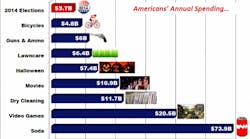Well the midterm elections are thankfully over. Char and I won’t know what to do at night without the political ad calls. So, for the next year and a half or so we’ll have to settle for the good old computer-dialed, irritating insults to our intelligence from charity, sales and scam calls.
It seemed like this year’s political push was particularly annoying, probably because almost $4 Billion was spent to influence the hoi polloi, the masses, the Joe Six-packs. All of we folks for which the ad agencies show so little respect.
Both major parties spent about an equal amount.
On the other hand, according to the Washington Post, the total election amount was almost insignificant compared to other annual American spending:
But the article goes on to point out that: “The $3.7 billion spent on the 2014 election comes from a relative pittance of the overall U.S. population. According to the Center for Responsive Politics, just 666,773 individuals had donated more than $200 to campaigns, parties and political action committees in the 2014 election cycle. ….Do a little math and you see that the number of people who helped finance Tuesday's election amount to .2 percent of the United States' population of 316 million. ”
That’s most troubling - a tiny group of Americans have spent so much to propagandize the majority. It seems that our country is indeed turning into an oligarchy, with a small number of powerful players from both left and right political leanings using huge amounts of money to win a political war to win control. And most of us little folks are caught in the middle
But getting back to the context of the power industry, here’s something to think about. The American Recovery Act provided $3.4 Billion of matching funds for grid modernization. That’s less than the expenditure for one midterm election (and about five percent of what Americans spend for soda pop).
(Now, if we could just get some of that money spent on video games and lottery and put it into infrastructure repair and upgrades ….dream on!)
But that doesn’t mean that energy issues aren’t high on the list of skirmishes to be held between the GOP controlled congress and president. The Keystone pipeline, coal plant restrictions and other climate-change related issues are on the table and some are close to the waste basket. And, of course, there are the subsidies for renewables.
With the possible exception of Keystone, the course of these issues could impact construction and operation of the electrical grid. Planned closing of major coal plants, and even some gas generation, will require re-routing and new construction of transmission. Potential haggling between the administration and congress would create enormous investment uncertainty and delay. And, of course, potential reduction in renewable subsidies could raise the investment risk for new transmission.
So many issues that affect our industry are in the hands of politicians and lobbyists who can’t really understand the challenges.



